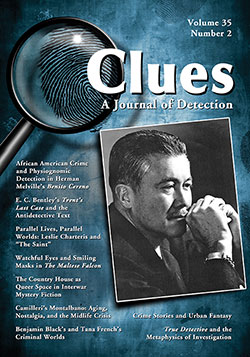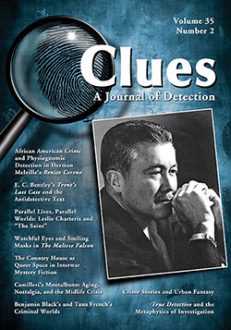Clues: A Journal of Detection, Vol. 35, No. 2 (Fall 2017)
Print Back Issue$30.00
In stock
About the Book
BACK ISSUE
This is a single back issue only. To order a current subscription, or for more information, please visit the journal’s web page at CluesJournal.com. Back issues from earlier volumes of Clues are available for order subject to availability. Also, single issues of the current volume may be ordered one at a time. Individuals may order back issues directly from our online catalog, and the charge for individuals is $30 (excluding postage). Issues from Volume 33 to the present are also available in ebook format on Kindle, Nook and Google Play.
The charge for single issues for institutions is $75 per issue (excluding postage). If your institution requires a back issue, please contact us to order at the appropriate rate.
About the Author(s)
Bibliographic Details
Executive Editor Janice M. Allan
Managing Editor Elizabeth Foxwell
Consulting Editor Margaret Kinsman
Format: softcover (7 x 10), back issue
Pages: 125
Bibliographic Info:
Copyright Date: 2017
ISSN: 0742-4248
Imprint: McFarland
Table of Contents
Introduction: In Conversation
Janice M. Allan 5
The executive editor of Clues discusses the Table of Contents of the issue, including analyses of works by E. C. Bentley, Benjamin Black, Andrea Camilleri, Leslie Charteris, Agatha Christie, Tana French, Dashiell Hammett, and Herman Melville, and the TV series True Detective.
“The Impotence of Human Reason”: E. C. Bentley’s Trent’s Last Case and the Antidetective Text
Nathan Ashman 7
This article considers the subversion of the analytical detective format in E. C. Bentley’s Trent’s Last Case (1913). Exploring the text’s problematization of concepts such as logic and reason as well as its disruption of the detective’s ocularcentric interpretative framework, the author highlights the ways in which Trent’s Last Case unsettles delineations between the classic analytic detective story and the metaphysical or antidetective text.
Watchful Eyes and Smiling Masks in The Maltese Falcon
Nils Clausson 18
This article calls attention to the more than 250 references to eyes and their pervasive role in Dashiell Hammett’s The Maltese Falcon, arguing that the novel portrays a world in which trying to see past duplicity, dissimulation, and role playing of others, while seeking to hide one’s own, is pervasive.
Labyrinths of Uncertainty: True Detective and the Metaphysics of Investigation
Paul Sheehan and Lauren Alice 28
This article outlines some of the salient features and ad hoc history of metaphysical detective fiction (MPDF). Using True Detective season 1 as a case study, it explores how the series takes advantage of new programming freedoms to dramatize MPDF for a “broadcast literature” audience.
“A wholly other world of things, hidden”: Benjamin Black’s and Tana French’s Criminal Worlds
Kersti Tarien Powell 40
This essay examines the recent success of Irish crime fiction through the works of Tana French and John Banville/Benjamin Black. Whereas the classic detective novel seeks to narrow multiple possibilities down to one determinate solution, French and Black resist this narrative pattern. In so doing, their novels both reclaim and reinvent the Irish literary tradition.
Crime Stories and Urban Fantasy
Stefan Ekman 48
Among the many unexplored areas of urban fantasy is its relation to crime fiction. This article explores how features of the crime story are used to emphasize, reinforce, or introduce urban fantasy’s social commentary. It looks at the genres’ relationship, analyzing three urban fantasies and their respective crime fiction elements.
Camilleri’s Montalbano: Aging, Nostalgia, and the Midlife Crisis
Stephen Derek Kolsky 58
Salvo Montalbano, the protagonist of Andrea Camilleri’s detective series, goes through a midlife crisis that creates a biographical and ideological line of separation between the earlier and later novels, resulting in a new emphasis on the personal in the form of fleeting passionate engagements and less on social commitment.
Parallel Lives, Parallel Worlds: Leslie Charteris and “The Saint”
Ted Beardow 69
This article examines the close relationship between author and character in the fiction of Leslie Charteris. Charteris created his thriller hero, Simon Templar or “the Saint,” as an image of what he was and what he would like to have been. Templar’s activities, attitudes, and multifaceted nature strongly reflect the life, experience, and emotions of his creator.
“Tea and scandal at four-thirty”: Fantasies of Englishness and Agatha Christie’s Fiction of the 1930s and 1940s
Christopher Yiannitsaros 78
Through examining the ways in which three of Agatha Christie’s novels expose the imperial underpinnings of the English village, invert ideas regarding miscegenous relationships and spotlight the decline of the English ancestral estate, this article reassesses Christie’s articulation of English national identity, arguing that her relationship with established notions of Englishness is more ambivalent than is often recognized.
A Strange Night in a Strange House: The Country House as Queer Space in Interwar Mystery Fiction
Charlotte Charteris 89
Drawing on Barry McCrea’s work on Arthur Conan Doyle, this article challenges claims that the interwar country-house mystery arose from reactionary nostalgia for a “dead” institution. Responding not to a sudden death but to a slow decline, the form in fact facilitated the country house’s reconfiguration as a biologically sterile but narratively generative queer space.
African American Crime and Physiognomic Detection in Herman Melville’s Benito Cereno
Brian Baaki 100
Placing Herman Melville’s historical novel Benito Cereno (1855) in the context of the antebellum north, this essay explores its representation of criminal detection. Melville’s novella mainly relates the thoughts and perceptions of American sea captain Amasa Delano who, suspecting some sort of plot or treachery aboard a strange ship, employs a method of detection that evokes physiognomic theories developed near the time of the story’s setting in the late–eighteenth century.
Reviews
Yan Zi-Ling. Economic Investigations in Twentieth-Century Detective Fiction: Expenditure, Labor, Value. Mary Anna Evans 111
Susanna Lee. Hard-Boiled Crime Fiction and the Decline of Moral Authority. Annika R. P. Deutsch 112
Robert Lance Snyder. John le Carré’s Post–Cold War Fiction. David Seed 113
Enrico Minardi and Jennifer Byron, eds. Out of Deadlock: Female Emancipation in Sara Paretsky’s V. I. Warshawski Novels and Her Influence on Contemporary Crime Fiction. Susan Rowland 114
Carolina Miranda, Jean Anderson, and Barbara Pezzotti, eds. Serial Crime Fiction: Dying for More. Jennifer Schnabel 116
Kecia Ali. Human in Death: Morality and Mortality in J. D. Robb’s Novels. Heta Pyrhönen 117
Susan Rowland. The Sleuth and the Goddess: Hestia, Artemis, Athena and Aphrodite in Women’s Detective Fiction. Phyllis M. Betz 118
Clues Index, Volume 35 121
Author Guidelines 125
Book Reviews & Awards
- “Clues is a must-have for readers and writers of crime fiction. Scholarly, thought-provoking, wide-ranging in its topics, Clues covers the crime and thriller map.”—Sara Paretsky
- “A. Conan Doyle, notoriously resentful of Sherlock Holmes’s success, liked to scorn ‘police romances’ as less significant and worthy of his talents than his other literary work. If he could have read Clues, the thinking mystery reader’s journal, he would surely have felt differently—and learned much he never realized himself about even his own landmark contribution to the genre, from which so much else by others has flowed.”—Jon Lellenberg, U.S. agent for the Arthur Conan Doyle estate
- “I love reading Clues. Every issue provides thought-provoking, well-researched articles. The variety and scope of the material found in Clues makes an unparalleled, ongoing contribution to our understanding of the role of crime fiction in our culture, and the genre’s reflection of its time and society.”—Jan Burke, Edgar-winning author of The Messenger (2009)
- “Clues is an important journal. It carries the torch of tradition that is the backbone of detective fiction. It goes below the surface and gets to the heart of what makes the genre so fascinating and valid today”—Michael Connelly, author of the Harry Bosch novels, including The Overlook (2007)
- “For erudite and fascinating truths about mysteries, follow the clues to Clues, the scholarly journal that is an essential resource for every serious student of the mystery”—Carolyn Hart, author of Death Walked In (2008)
- “With scholarship ranging from Poe to Peters, nothing beats Clues”—Joan Hess, author of Mummy Dearest (2008).





